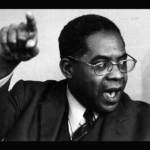Quote:
The coloniser, who in order to ease his conscience gets into the habit of seeing the other man as an animal, accustoms himself to treating him like an animal, and tends objectively to transform himself into an animal. (…) They talk to me about progress, achievements, diseases cured, improved standards of living. I am talking about (…) development oriented solely toward the benefit of the metropolitan countries, about the looting of products, the looting of raw materials. They talk to me about civilisation. I talk about proletarianisation and mystification.
Source:
Aimé Césaire (1968/2000)
Author Bio:
Aimé Césaire (1913-2008) was an Afro-Caribbean French writer and politician, founder of the Negritude movement that sought to liberate Black people from colonial rule.
Context:
 In his 1950 essay On Colonialism, from which this quote comes, Césaire denounced the fact that while colonialism feigned a desire to "civilise", its real goal was always exploitation (1968: 8). Both the colonised and European proletarians, he wrote, had understood this long ago (1968: 6). Here, Césaire posited a problematic connection between the Holocaust and colonial genocide, writing that ‘what he [the European citizen] does not forgive Hitler [is] not the crime per se (...) but that it is a crime against white people’ (1968: 12). in a different vein, Michael Rothberg argues for a multidimensional culture of remembrance that does not set victims against each other. For an example of such a position, see the cooperation between Ibrahim Arslan, survivor of the racist arson attack in Mölln/Northwest Germany, and Ester Bejarano, Auschwitz survivor (Möllner Reden im Exil from 2013).
In his 1950 essay On Colonialism, from which this quote comes, Césaire denounced the fact that while colonialism feigned a desire to "civilise", its real goal was always exploitation (1968: 8). Both the colonised and European proletarians, he wrote, had understood this long ago (1968: 6). Here, Césaire posited a problematic connection between the Holocaust and colonial genocide, writing that ‘what he [the European citizen] does not forgive Hitler [is] not the crime per se (...) but that it is a crime against white people’ (1968: 12). in a different vein, Michael Rothberg argues for a multidimensional culture of remembrance that does not set victims against each other. For an example of such a position, see the cooperation between Ibrahim Arslan, survivor of the racist arson attack in Mölln/Northwest Germany, and Ester Bejarano, Auschwitz survivor (Möllner Reden im Exil from 2013).Further Reading:
*Aimee Césaire (2000): Discourse on Colonialism. A Poetics of Anticolonialism.
Year:
1968